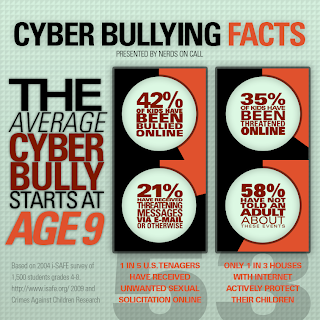Parents Cyber Education
This was a question posted by one of my colleague and it really made me think of whose job is it. I personally think that as a responsible parent of a tween and teenager, it is our job to educate ourselves because we are as connected as our kids. Some parents are so connected that they don't budge when their young ones are trying to communicate to them. Many parents are careful about what they post on their social networking system (at least most parents I know); some really go out their way to find answers or know many things about guarding what they put out in the web. Educating ourselves (parents) should be our responsibility.
As parents, ponder and reflect why we provide our children with all these smart technology if we do not have a clear purpose aside from the most obvious reason that is to get in touch with them. Sometimes I think that we are in small way plays a role in why our children can get cyber-bullied by putting those smart technologies in their hands without a clear expectations, rules and consequences.





